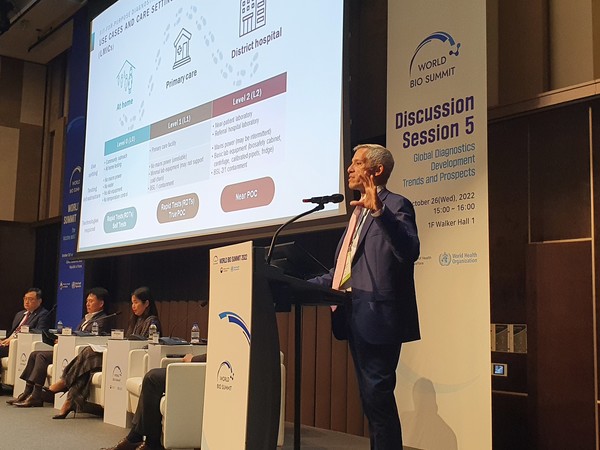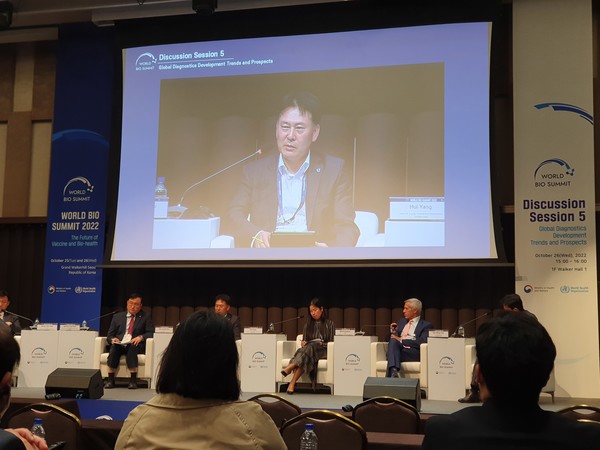The Korean diagnostic device manufacturers should leverage their successes in the vaccine industry to address the growing global demand for low-cost, high-quality testing kits, said the head of a global health non-profit organization.

“We believe the Korean diagnostics industry is both well-positioned and essential to further this agenda,” said Bill Rodriguez, CEO of the Switzerland-based Foundation for Innovative Diagnostics (FIND), after presenting the global diagnostics trends and future prospects during the World Bio Summit in Seoul, Wednesday.
According to Rodriguez, Korea’s in vitro diagnostics (IVD) industry and FIND have partnered to expand manufacturing capacity and technology innovation with respect to Covid-19 and other point-of-care (POC) molecular platforms and assist in technology transfers.
FIND would like to engage more Korean companies in addressing these markets with tests to deliver the performance, accessibility and affordability that’s needed, he went on to say.
Rodriguez also noted the steep growth in demand for primary health diagnostics which is forecasted to reach up to $38 billion in Africa, Asia Pacific and Latin America by 2024, driven by Covid-19 which spurred a 53 percent increase in IVD sales from 2019 to 2020.
Highlighting some underserved markets, he mentioned malaria requires more rapid diagnostic tests (RDTs) for diagnosis and surveillance to reduce the $12 billion disease burden impact on the economy. He added, “Molecular tests emerging from Covid-19 can help drive better response for TB diagnostics which is grossly underdiagnosed with 62 percent of patients coming from the Asia- Pacific region.”
He also noted that POC tests are transforming towards multiplex diagnostics to use patient samples to identify multiple diseases instead of single-pathogen diagnostic platforms.
Echoing similar sentiments, bioMerieux’s Vice President Kim Dae-whan highlighted that Korea needs to shift its Covid-19 excellent testing capacity towards a broader group of pathogens like malaria, flu and other infectious disease using syndromic testing.

Kim noted that while Covid-19 brought about some changes, these technologies were not technology innovations but rather the existing technology implemented in an innovative way for the Covid-19 pandemic.
On another note, he also broached the topic of antimicrobial resistance (AMR) which increased during the Covid-19 pandemic and highlighted the role of diagnostics in reducing unnecessary prescriptions.
Also joining the presenters on stage were SD Biosensor’s CEO Heo Tae-young, Seegene’s Senior Vice President Kim Seong-youl and Korea Medical Device Development Fund CEO Kim Beop-min for the discussion session.
Addressing the topic of equitable access of diagnostics, SD Biosensor’s Heo emphasized the supporting role that organizations like WHO, FIND and others play in accessing the Global Fund for procurement and registration approvals together with round-table discussions with all stakeholders to set up more localized production facilities for lower risk to the manufacturers.

